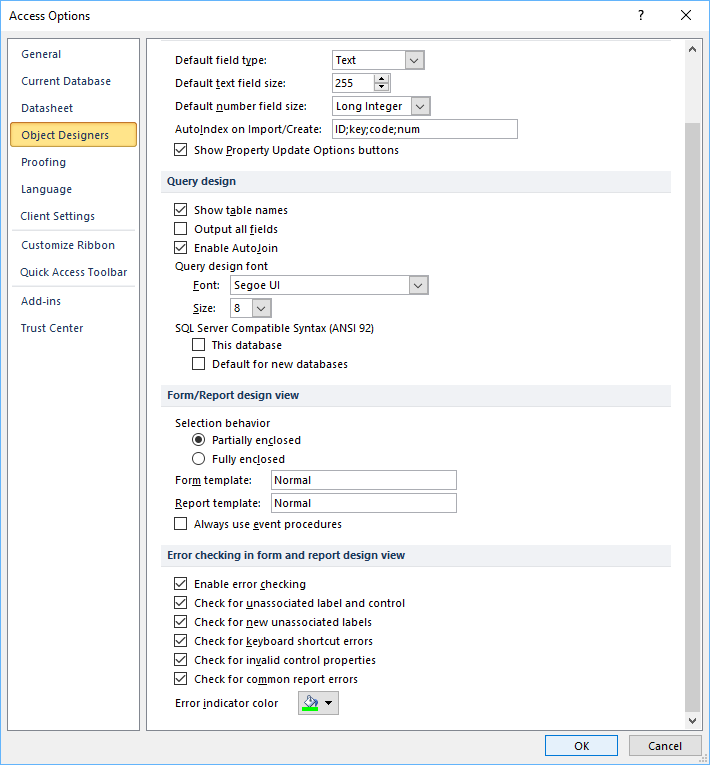Turn Off or Customize Error Checking in Microsoft Access
by Avantix Learning Team | Updated April 9, 2021
Applies to: Microsoft® Access® 2010, 2013, 2016, 2019 and 365 (Windows)
In Microsoft Access, small green error markers may appear in Design View in forms and reports for a number of reasons. These triangular markers display when there may be an error since Access checks forms, reports and controls against the error checking settings or rules in the Options dialog box. Indicators usually appear in the upper-left corner of a form or report and the upper-left or upper-right corner of a control.
You can turn error checking off completely or set the rules you prefer in the Options dialog. The default settings can cause some irritating behaviour (like flagging unattached controls).
Recommended article: 10 Microsoft Access Tips for Working with Select Queries
Do you want to learn more about Microsoft Access? Check out our virtual classroom or live classroom Access courses >
Change error checking options or rules
To turn off or change error checking options or rules in Access:
- Click the File tab in the Ribbon.
- Select Options. A dialog box appears.
- Click Object Designers in the left pane.
- In the right pane, select the desired options under Error checking in form and report design view.
- Click OK.
Below is the Access Options dialog as it appears in Access 2010 (and is very similar for other versions):
Turn error checking off or on
To turn error checking on or off in the Access Options dialog (Object Designers category):
- Check or uncheck Enable error checking.
- Click OK.
Change the error marker color
To change the error marker color, in the Access Options dialog (Object Designers category):
- Beside Error indicator color, select an alternate color from the color menu.
- Click OK.
Access error checking rules
The following error checking rules in the Access Options dialog (Object Designers category) are enabled by default:
- Check for unassociated label and control – when you select a control and a label, Access checks to ensure that the selected objects are associated with each other.
- Check for new unassociated label – this setting applies only to forms and enables Access to check all new labels to ensure that they are associated with a control.
- Check for keyboard shortcut error – this setting applies only to forms and causes Access to check for duplicate keyboard shortcuts and invalid shortcuts (such as space characters) and provides a list of alternatives.
- Check for invalid control properties – Access checks controls for invalid property settings (such as invalid expressions or field names).
- Check for common report errors – this setting applies only to reports and causes Access to check reports for common errors such as invalid sort orders or widths greater than the selected paper size.
Error checking markers can be very irritating and it's simple to change or disable error checking settings in Microsoft Access.
Subscribe to get more articles like this one
Did you find this article helpful? If you would like to receive new articles, join our email list.
More resources
How to Convert a Microsoft Access Report to PDF (3 Ways)
How to Filter a Report on the Fly in Microsoft Access
10 Techniques for Designing Forms in Microsoft Access
Related courses
Microsoft Access: Introduction
Microsoft Access: Intermediate / Advanced
Microsoft Access: Introduction to VBA (Visual Basic for Applications)
Our instructor-led courses are delivered in virtual classroom format or at our downtown Toronto location at 18 King Street East, Suite 1400, Toronto, Ontario, Canada (some in-person classroom courses may also be delivered at an alternate downtown Toronto location). Contact us at info@avantixlearning.ca if you'd like to arrange custom instructor-led virtual classroom or onsite training on a date that's convenient for you.
Copyright 2024 Avantix® Learning
You may also like
How to Highlight Records or Values in a Microsoft Access Report Using Conditional Formatting
You can highlight values in fields or records in Microsoft Access reports using conditional formatting. Certain conditions must be met in order for the formatting to be applied …
How to Create a Calculated Field in a Microsoft Access Query
You can create calculated fields in select queries in Microsoft Access in the QBE (Query by Example) grid. You'll need to learn a few syntax rules and then you can create simple to more complex calculations.
10 Useful Microsoft Access Shortcuts When You're Working with Controls on Forms and Reports
Check out these great shortcuts for manipulating controls in Design View in both forms and reports in Microsoft Access.
Microsoft, the Microsoft logo, Microsoft Office and related Microsoft applications and logos are registered trademarks of Microsoft Corporation in Canada, US and other countries. All other trademarks are the property of the registered owners.
Avantix Learning |18 King Street East, Suite 1400, Toronto, Ontario, Canada M5C 1C4 | Contact us at info@avantixlearning.ca








